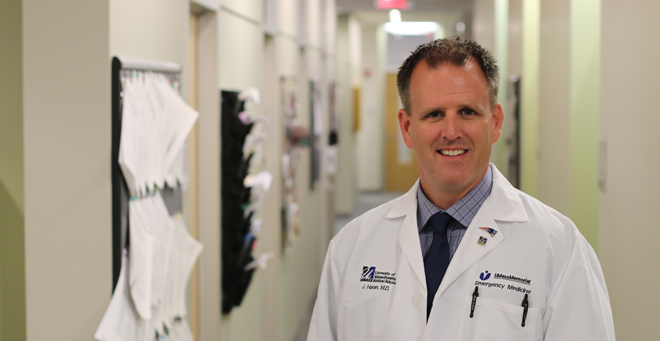John Haran

John P. Haran, MD, PhD
Professor of Emergency Medicine & Director of Research
Professor of Microbiology and Physiological Systems
Clinical Director for the Program in Microbiome Dynamics
Dr. John Haran is a Professor of Emergency Medicine and Microbiology & Physiological Systems at UMass Chan Medical School in Worcester Massachusetts. He is Research Director for the Department of Emergency Medicine and is also the Clinical Director for the Center for Microbiome Research and founding member of the Program in Microbiome Dynamics at UMass Chan. He graduated from UMass Chan Medical School in 2007 and completed Residency training at Brown University in 2011. He has been at UMass Chan since then, completing his PhD training in Biomedical Sciences in 2018.
Dr. Haran’s research background has focused on investigations into older adult health and associations with microbiome composition and health outcomes in both nursing home and community-dwelling patients. His earlier work had focused on the microbiome and how dysbiosis can lead to increased risk of bacterial colonization and infection. The centerpiece of Dr. Haran’s current lab’s focus is on the microbiome-gut-brain axis and cognitive function in older adults especially those suffering from Alzheimer’s disease. Working with longitudinal cohorts of older adults, his lab has begun to unravel the microbiome’s role in inflammation, immune dysfunction, and neurodegeneration. Importantly, they have published on the dysbiotic microbiome in older adults with Alzheimer’s disease and replicated findings in our in vitro models and in transgenic Alzheimer’s disease mouse models. His lab includes a collaborative team that has demonstrated the power of machine learning and AI in interpreting complex findings and discovering possible causal mechanisms in Alzheimer’s disease.
Dr. Haran has been consistently funded by the NIH with recent National Institute on Aging R01 and Alzheimer’s Association foundation grants which focus on the gut microbiomes and the roles they play in the “microbiome-gut-brain axis”. He has published findings demonstrating that the intestinal microbiome of older adults with Alzheimer’s disease have a pro-inflammatory dysbiotic pattern that can induce disruption of the intestinal epithelium homeostasis in his in vitro/vivo models. He currently leads a team that is enrolling and following older adults with cognitive impairment, collecting longitudinal cognitive and microbiome data. Through the use of whole genome sequencing and various in vivoand in vitro models exploring the hypothesis that the microbiome is the driver of immune system dysfunction leading to neuroinflammation and neurocognitive decline. His work focuses on specific mechanisms by which the bacteria within the gut can affect immune functions and neuroinflammation.